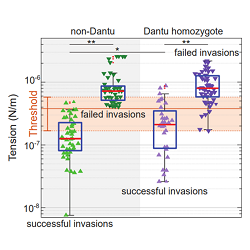
Over the centuries, malaria has selected for many natural human genetic variants such as sickle haemoglobin that provide protection against severe disease. One such variant, Dantu, codes for an unusual hybrid glycophorin protein on the surface of red blood cells and is only found at high frequency in coastal East Africa. Determining how Dantu protects against malaria is the focus of a new paper published in Nature by a multidisciplinary team featuring multiple CIMR authors from the Rayner and Weekes labs, together with researchers from Cambridge’s Cavendish Laboratory, the KEMRI Research Institute (Kenya) and the Wellcome Sanger Institute. The paper’s key finding is that membranes of red blood cells from people carrying the Dantu variant are under increased biophysical tension, which makes them more resistant to invasion by the malaria parasite. Tension varies naturally across all red blood cells, and this work identifies for the first time a tension threshold above which invasion routinely fails, pointing to novel ways to treat this deadly disease.

